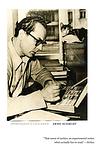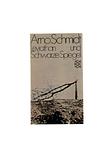Arno Schmidt
Arno Schmidt was a German author and translator known for his experimental writing style and his ambitious Zettel's Traum, a 1334-page work that challenges conventional grammar and typography. Born on January 18, 1914, and passing on June 3, 1979, Schmidt is often considered an important figure in post-war German literature. His works often explore themes of isolation, history, and sexuality, and are characterized by their intellectual depth and linguistic innovation.
Books
This list of books are ONLY the books that have been ranked on the lists that are aggregated on this site. This is not a comprehensive list of all books by this author.
-
1. The Egghead Republic
The book is a satirical science fiction novella that takes readers on a journey through a post-apocalyptic world. Set in a future where a catastrophic event has fragmented society, the story follows a journalist as he travels to an artificial island known as the Egghead Republic, a haven for intellectuals and scientists. This enclave is dedicated to preserving knowledge and culture amidst the chaos of the outside world. The narrative is characterized by its linguistic inventiveness and complex wordplay, as it explores themes of isolation, the role of intellectuals in society, and the nature of human civilization through the lens of a dystopian future.
-
2. Scenes From The Life Of A Faun
"Scenes from the Life of a Faun" is a complex and experimental novel that delves into the psyche of a German civil servant living in the aftermath of World War II. The protagonist, burdened by the guilt and trauma of the war, retreats into a fantasy world where he imagines himself as a mythological faun. Through a fragmented narrative structure and a dense web of literary and historical references, the book explores themes of memory, responsibility, and the struggle to find meaning in a shattered world. The protagonist's internal journey is a reflection on the moral ambiguities of his time, as he grapples with his complicity in the horrors of the past while seeking redemption in his personal mythology.
-
3. Leviathan
"Leviathan" is a complex narrative that delves into the psyche of a German intellectual coping with the aftermath of World War II. The protagonist, a reclusive translator, grapples with his own personal demons and the broader existential crisis of a nation in ruins. Through a series of introspective monologues and interactions with both real and imagined characters, the book explores themes of guilt, isolation, and the search for meaning in a world that has been irrevocably altered by the horrors of war. The novel's dense and challenging prose, combined with its allusions to mythology and literature, creates a rich tapestry that demands the reader's engagement with the historical and philosophical questions it raises.


